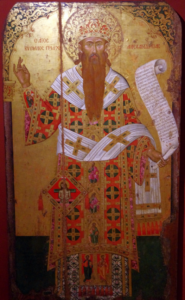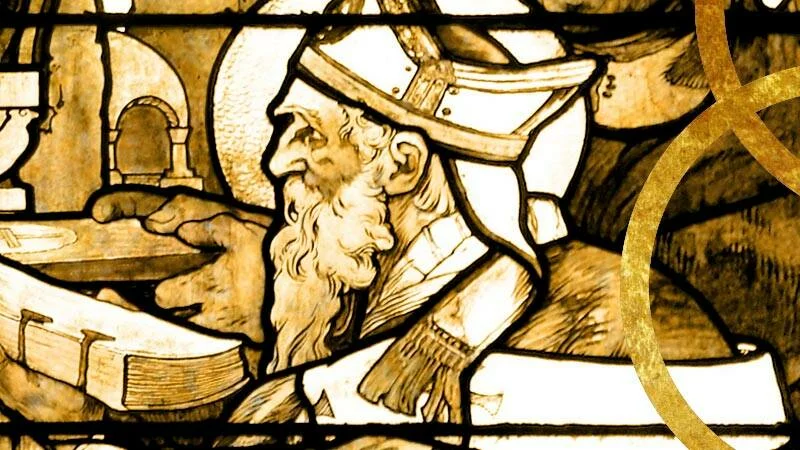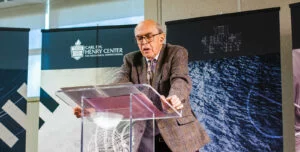Genesis 2:7 states, “Then the LORD God formed the man of dust from the ground and breathed into his nostrils the breath of life, and the man became a living creature.” But what does “the breath of life” refer to?
Is it the Holy Spirit? Is it a life force? Is it a human soul? The answer to this question is critically important for understanding biblical anthropology and therefore also the fall into sin and salvation. If salvation is understood as a return to God’s original design for creation, then Gen. 2:7 tells us what we lost in Adam and what we gain in Christ. We can see this line of theological reflection represented with particular clarity in Cyril of Alexandria’s Commentary on John.
Cyril’s Commentary on John is a work that is intended to assist catechists in their task of teaching the faith to the catechumens.See David R. Maxwell, Commentary on John: Cyril of Alexandria, vol. 1 (Downers Grove: IVP Academic, 2013), xvii-xix. Because it is concerned with the big picture of Christian theology, it is particularly well suited for tracing a foundational text like Gen. 2:7 through other aspects of theology. In this post I will discuss what Cyril has to say about Gen. 2:7 in his John commentary in light of the larger theological vision he presents in that work.
The Soul is not the Spirit
Cyril explicitly identifies the “breath of life” in Gen. 2:7 as the Holy Spirit. However, he is concerned that some might misunderstand the passage and assume that the Holy Spirit became Adam’s soul. He warns his readers, “Let none of us catechize falsely on this point.”Cyril, Commentary on John 14:20 (Maxwell 2:187). The exegetical difficulty he is wrestling with here comes into sharper focus when one considers the text of the Septuagint: καὶ ἐγένετο ὁ ἄνθρωπος εἰς ψυχὴν ζῶσαν (and the man became a living soul). The word became (ἐγένετο) is a freighted term for Cyril.Cyril explicitly identifies the “breath of life” in Gen. 2:7 as the Holy Spirit. One can see this in his remarks on John 1. John 1:1 says, “In the beginning was (ἦν) the Word,” but when the Evangelist comes to John the Baptist in verse 6, he says, “There became (ἐγένετο) a man sent from God.”This is my translation. I translated it literally so the reader could follow Cyril’s treatment of the word became. For Cyril, this choice of words is but one instance of a larger Scriptural principle: “to be” is used to describe God, while “to become” is used to describe creatures because they have an originate (γενητός) nature.Cyril, Commentary on John 1:6-7 (Maxwell 1:40-41). Therefore, he wants to make doubly sure that the catechists pay attention to the wording of Gen. 2:7 and realize that it is the man who “became” something, not the Spirit. It would be blasphemous, Cyril maintains, to suggest that the Spirit, who has an immutable nature, changed into a different nature, and one that is subject to passions at that!Cyril, Commentary on John 14:20 (Maxwell 2:187).
How then does Adam’s human soul factor into all this? Cyril describes the sequence this way: “After the creature was ensouled, or rather after it arrived at the condition of its complete nature through both (I mean body and soul), then, like a stamp of his own nature, the creator fixed upon it the Holy Spirit, that is, the breath of life, through which he shaped it into its archetypal beauty.”Cyril, Commentary on John 14:20 (Maxwell 2:187). The ensoulment of Adam took place before God breathed into him the breath of life. Yet it is the breath of life that actually makes Adam alive.The ensoulment of Adam took place before God breathed into him the breath of life. Yet it is the breath of life that actually makes Adam alive. At another point Cyril paraphrases Genesis 2:7 to mean that the “Spirit put life into the one who had been formed.”Cyril, Commentary on John 1:32-33 (Maxwell 1:81).
Adam, therefore, did not receive life by being ensouled, but by receiving the Holy Spirit. This is a profound theological insight that challenges our very notion of “life.” I think Christians today tend to think of life as a human attribute (or more broadly a creaturely attribute). It is a gift from God to be sure, but it belongs on the creature’s side of the Creator/creature distinction. For Cyril, by contrast, life (which also entails incorruptibility) is a divine attribute. That is why Cyril can describe Genesis 2:7 as giving humanity a “good that is above its nature.”Cyril, Commentary on John 1:14 (Maxwell 1:63). It is why he can say that when God breathed into Adam’s face, he made him a “partaker of his own nature.”Cyril, Commentary on John 14:20 (Maxwell 2:187). Creatures have life only by participating in God.
This is not only the case for human beings, but also for all living things. In his comments on John 1:4, Cyril gives the following explanation of the Son’s involvement in creation:
The Son not only gifts creation by calling it into being, but once it has come into being, he also holds it together through himself. He mixes himself in, so to speak, with those things that do not have eternal being by their own nature, and he becomes life to those things that exist so that once they have come into being, they may remain and be preserved, each one according to the definition of its own nature.Cyril, Commentary on John 1:4 (Maxwell 1:32), emphasis added. Cyril has the same text of Jn 1:4 as English translations are working with, but he construes the words differently. He reads the verse as follows: “That which came into being—in it was life.”
Here again the definition of life is not to be found on the creature’s side of the Creator/creature distinction. In our context, we might say that one cannot fully comprehend life by examining the biological processes involved. Rather, the Son himself is the life of all living things.
When Sin Rules, the Spirit Departs

St. Cyril of Alexandria (1654)
Correspondingly, when Cyril describes the fall into sin, he often focuses on the loss of the Spirit and the loss of life. He identifies the curse in Gen. 3:19, “Earth you are, and to earth you will return”When Cyril quotes the Old Testament, he always quotes the Septuagint. In Gen. 3:19, the Septuagint has “earth,” not “dust” as English Bibles, following the Hebrew, do. as the “just punishment” for Adam’s sin.Cyril, Commentary on John 1:14 (Maxwell 1:63). That verse is decisive for Cyril’s description of the results of the fall, but his fall narrative actually extends beyond the Garden of Eden all the way into Genesis 6. Following the contours of Genesis, Cyril maintains that sin gets worse and worse until humanity reaches rock bottom right before the flood. The stamp of God’s image on humanity became “more obscure” until finally “the human race reached a great multitude and sin ruled over all of them” and the “Spirit departed completely.”Cyril, Commentary on John 1:32-33 (Maxwell 1:81). The only reason the soul remains immortal is that the curse of Gen. 3:19 was addressed to the flesh alone.Cyril, Commentary on John 1:32-33 (Maxwell 1:81). The question of why life continues after the Fall is rather complicated. Since Cyril wants to say that even after the Fall, creatures have life only by participation in God, perhaps we should posit different modes of participation, such that after the Fall our participation is attenuated but still keeps us alive.
Here Cyril seems to be paraphrasing Gen. 6:1-8, which describes the dire condition of the human race before the flood. This is the point where the Holy Spirit departs from the human race, according to Cyril. Though he does not cite the passage here, that claim seems to be based on Gen. 6:4, where God says “My Spirit shall not abide in man forever, for he is flesh.”
Salvation – A Return to Genesis 2:7
Salvation for Cyril reverses this loss. One of the many images Cyril uses to describe salvation is theosis, or divinization. The two most often cited Scripture texts in this regard are “You are gods” (Psa. 82:6) and “so that through them [God’s promises] you may become partakers of the divine nature” (2 Pet. 1:4). When Cyril describes salvation this way, he often says that God raises us to a dignity beyond our nature. What does this mean exactly? Does Cyril want us to feel dissatisfied with the limits of our creatureliness and to hope to transcend our created status?
A surface reading of this kind of language might suggest so, but it would also blur the distinction between the Creator and creation. This is the last thing Cyril would want to do. The Commentary on John is written against the Arians, who want to put the Son in a middle position between God and creation. Against this, Cyril insists strenuously on a sharp distinction between Creator and creation, as did Athanasius before him. So it seems unlikely that he would endorse a soteriology that would undermine this facet of his argumentation against the Arians.
I believe that Cyril’s understanding of Gen. 2:7 holds the key to what he means by divinization. We have seen above that life is a divine attribute and that when God breathed the breath of life into Adam, he gave humanity “a good that is above its nature.”Commentary on John 1:14 (Maxwell 1:63). Language of divinization, then, suggest a return to Gen. 2:7. Cyril makes this clear in his comments on John 14:20:
Now it is clear to everyone, I think, that the Only Begotten, though he was God from God by nature, became a human being for these reasons: to condemn sin in the flesh, to kill death by his own death, and to make us children of God, giving new birth in the Spirit to those on earth, thus elevating them to a dignity beyond their nature. It was of course a very good thing to recapitulate in this way and restore the fallen race, that is, the human race, to its original condition.Commentary on John 14:20 (Maxwell 2:186).
Note that in this passage, elevating us to a dignity beyond our nature is equivalent to returning us to our original condition. Cyril’s language of divinization should be understood as a return to the fullness of our creaturely status, not an escape from it.Therefore, Cyril’s language of divinization should be understood as a return to the fullness of our creaturely status, not an escape from it.
Now that I have briefly traced a few implications of Cyril’s exegesis of Gen. 2:7 through his understanding of the fall and salvation, let me take a step back and offer a couple of suggestions regarding the broader theological significance of these themes. At heart, I think Cyril presents us with a vision of humanity (and more generally creation) in which there is no creaturely sphere of independence from God. In Cyril’s Christology, for example, there is no independently acting human subject in Christ. The divine Word is the human subject. And though Cyril was not involved in the Pelagian controversy, that controversy raised similar questions about the relation between God and his creatures. Augustine’s insistence on divine monergism could be seen as a similar theological vision applied to the Christian. One’s understanding of “life,” then, as well as one’s exegesis of Gen. 2:7 have profound implications for other articles of doctrine.








Comments
Be the first one to make a comment!